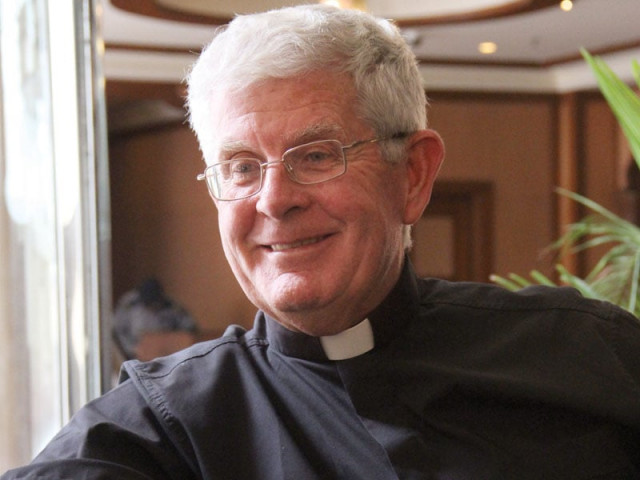From Australia, with love: Father McCulloch finds his true calling in Pakistan
Sindh govt awards him Sitara-e-Quaid-e-Azam for health and education services.

Father Robert McCulloch likes maash ki daal and Lata Mangeshkar’s melodious voice. For the Australian priest, a chance trip to Pakistan turned into a lifetime of serving the impoverished in Sindh.
On February 5, Father McCulloch received a phone call from Sindh Governor Dr Ishratul Ebad, informing him that he was being awarded the Sitara-e-Quaid-e-Azam for services to the country’s health and education sectors. “I sat back in my chair and pinched myself. I’ve spent more than half my life here. At that moment I truly felt as if this was my home,” he says.
“I volunteered to come to Pakistan,” he told The Express Tribune. “I could have had an academic career but the religious group [Columban Brothers] I worked with was invited for a visit.”
That trip was in 1978, but the priest ended up spending more than half of his life in the country, making his way from Lahore’s Old City to impoverished villages in Sindh.
He says Pakistan was less complicated, but at the age of 32, the priest was witness to one of the most tumultuous times in its history.
“At that time Pakistan was just 30 years old, in the middle of an identity crisis. I remember sitting in Lahore and listening to the BBC about what was supposed to happen,” shared Father McCulloch. “It totally changed the heart of the country. I will always remember with horror how people were being flogged in public.”
Changing attitudes
After Father McCulloch learnt Urdu, he travelled to smaller towns and villages on a motorcycle. “The citywalas really miss out on rural life.”
After a spell in Badin, he started working with the semi-nomadic Hindu tribe of Parkari Kohli in Tharparkar district. “There were no roads,” he said. “It was just a tiny sleepy village. Working there was physically demanding and time consuming. These people were and still are slaves to the feudal system. We were trying to secure their futures, provide them with medical care and education.”
Father McCulloch said health was one of their main concerns. “The villagers and their babies were dying of measles, tuberculosis and the whooping cough,” he said. The immunisation programme set up by the priest was run with the district authorities, and helped win over people.
He also helped start a school which has grown to a 400-student strong high school.
“People who were shunned from society noticed a change,” he said. “Muslim families opened their homes and this is what shifted cultural attitudes. This was what Mohammad Ali Jinnah had in mind when he wanted a separate country.”
As the priest and nuns gained the villagers’ trust, they also noticed how the better health and education facilities were impacting the youth. Father McCulloch recalled an anecdote: a farmer who was going over accounts with a landlord took his son along to double-check the calculations done by the landlord’s manager.
Save a language, save a culture
Father McCulloch also helped the tribe design a script for their language and called on two linguists for their help. “The villagers opted for the Sindhi script. It was all done with a few minor changes. People gathered proverbs and sayings and we launched the first Parkari Kohli newspaper, Prem Paracha. Helping save a language and culture is one of the things the Catholic Church has contributed to Sindh.”
During the floods, the priest made sure people had drinking water and a roof over their heads. “I saw people from different backgrounds and faith working together, it was beautiful,” he said. “We built 820 homes, provided solar energy and even helped some people find work.”
Since moving to Rome as Procurator-General of the Columban Brothers, Father McCulloch has visited Karachi twice and can’t wait to come back again.
“When my colleagues ask me how I felt about coming back, I said asmaan se nikla, khajoor ke darkhat mein atka, I was dropped out of heaven and now I’m stuck in a date tree.”
Get to know Father McCulloch
Born in Australia in 1946, Father Robert McCulloch was educated by the La Salle Brothers, a religious order that also taught former prime minister Yousaf Raza Gilani. He wanted to become a priest after reading an article in eighth grade. “I was very mature for my age,” he said. “Even then I knew what I wanted to do for the rest of my life.” His parents encouraged him to follow his heart and after 11 years of training, he was ordained a Catholic priest in 1970 in Melbourne. From 1970 to 1973, he worked in Southern Philippines. The next two years were spent in Rome for higher theological studies. From 1976 to 1978, Father McCulloch was in Washington DC earning a MA in Church History. He came to work in Pakistan in 1978 and stayed here for 34 years. He used to visit Karachi every month and taught Latin and Theology at the Catholic Christ the King Seminary, where priests spent the last four years of their training. He taught there for 27 years and in 2002 became the academic dean.
Father McCulloch went back to Rome in 1998 and was there till 2000 for a Doctorate in Theology. After he returned to Pakistan, he was asked to take over as chairperson of Hyderabad’s St Elizabeth Hospital.
Since November 2011, he has been working with the Vatican as Procurator-General of the Columban Brothers.
Published in The Express Tribune, June 29th, 2012.


















COMMENTS
Comments are moderated and generally will be posted if they are on-topic and not abusive.
For more information, please see our Comments FAQ